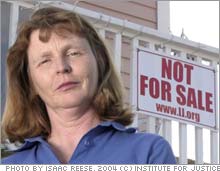Kelo's revenge: Voters restrict eminent domainEight states vote to prohibit or restrict the use of eminent domain to take property from one private individual and give it to another.NEW YORK (CNNMoney.com) -- When the Supreme Court ruled in the 2005 case, Kelo v. the City of New London, that a government agency could seize a citizen's home and give it to a private developer, it galvanized private-property advocates. They placed measures on the ballot in 11 states that would restrict "eminent domain," the government's right to take private property.
Voters on Tuesday responded by voting in favor of the restrictive measures in eight of those initiatives - call it Kelo's revenge. Two other states rejected similar ballot measures, and results for one were not expected until later on Wednesday. Arizona, Florida, Georgia, Michigan, Nevada, North Dakota, Oregon and South Carolina all passed initiatives to restrict the use of eminent domain, in most cases overwhelmingly. In Florida, 69 percent voted yes on an amendment that prohibits using eminent domain to force the transfer of property from one private individual or entity to another. In Georgia, 83 percent voted to approve an amendment to the state constitution that says eminent domain can be used only for public use. A school or park might be okay; the government taking land to give to a mall developer would not be. The most one-sided vote in favor took place in South Carolina, where 86 percent voted yes to an amendment restricting eminent domain for public use only. A ninth state, New Hampshire, was expected to approve a similar initiative, but results would not be made available until late Wednesday, Nov. 8. Failed to pass Voters in only two states rejected ballot measures that were designed to limit eminent domain. In California, 53 percent of voters said no to Proposition 90. In Idaho, 74 percent opposed Proposition 2. Critics of the ballot measures in those states charged that the language in both was much too broad, was poorly written and confusing and would make it difficult and expensive for local planning boards to operate efficiently. The Idaho Attorney General, Ben Ysursa, pointed out that eminent domain protections were already written into the State Constitution. According to Ysursa, the eminent domain part of Proposition 2 was only meant to distract attention from the initiative's real purpose, which he claims is to gut local planning boards. The result would be an erosion in protections for communities and declines in property values. As an example, Ysursa pointed out that if a neighbor decided to open a junkyard next door, Proposition 2 would enable the neighbor to file a lawsuit for compensation should the city or county deny him or her a permit. The California measure attracted a broad coalition of opponents from business groups to government workers to environmentalists. A lot of the opposition centers on wording that would require that the government compensate property owners if it imposes any new conditions or restrictions that result in a substantial economic loss for property owners. Environmentalists, including Robert Redford, worry this will tie the government's hands in enacting tough conservation regulations. Workers, such as teachers, worry about the tab for compensating big property owners. The nature of the opposition these propositions generated in the two states that rejected the ballot measures may have indicated that eminent domain critics overreached. If they had kept the ballot measure more basic, by simply restricting the use of eminent to public purposes, they may have won passage in California and Idaho as well. |
|

